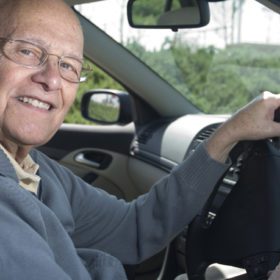 Older drivers many over the age of 70 have enjoyed decades of accident-free motoring and are generally considered experienced and safe drivers. They are no more likely to be involved in a road collision than anyone else, in fact there is considerable evidence that more mature drivers are safer than other drivers.
Older drivers many over the age of 70 have enjoyed decades of accident-free motoring and are generally considered experienced and safe drivers. They are no more likely to be involved in a road collision than anyone else, in fact there is considerable evidence that more mature drivers are safer than other drivers.
ROSPA (The Royal Society for the Prevention Of Accidents) published a paper in 2015 and reported that people still holding a driving licence at 70 are no more likely to be the cause of an accident than any other age group.
Getting into and out of your car can be a struggle as you get older, the twisting and turning motion to get comfortable or even reach for your seatbelt can be difficult and uncomfortable. You can find some clever motoring ideas here that are available to prevent you from straining or over reaching
The ageing process brings changes particularly related to health and physical ability, which can affect a driver’s confidence.
Did you know that there are some rules you must be aware of if you drive after 70?
You must renew your driving licence
Over two million motorists are taking to the road with out-of-date licences, an offence that can attract a fine of up to £1,000.
Many older drivers believe that their driving licence is for life. Everyone has to renew their driving licence. You must renew your driving licence when you reach 70, if you wish to continue driving or it will expire. You must then renew your license every three years, as long as you wish to continue driving.
You will receive a photocard licence instead of a paper licence, if you haven’t had one before – when you turn 70, even if you details haven’t changed. Even younger drivers must replace their drivers’ licence every 10years.
If you allow your license to expire without applying for a new one, you would be breaking the law if you continued to drive. But, more seriously this would invalidate your motor insurance too.
How do I renew my driving licence after 70?
If your address details have not changed the DVLA will send you a D46P application form 90 days before your 70th birthday – it is wise to check your details are up-to-date in good time. All drivers are obliged to inform DVLA of any change in their circumstances. Failure to notify DVLA of a change of address is against the law and you may be fined.
What if I don’t receive my D46P application form?
As your 70th birthday approaches, it is wise to check that all your details are upto date and if in any doubt contact DVLA and request a D46P at the same time. Ignorance is not an excuse, when concerning the law.
If you don’t receive a form to renew your driving licence by post, you can pick up a D1 application for a driving licence form at most Post Offices – this form can’t be downloaded online as it includes features that can’t be printed; but if you’d rather renew your driving licence in the comfort of your own home, simply apply online.
How do I renew my driving licence online?
Renewing your license online is simple on the gov.uk website: Renew your licence at age 70 and over
If you haven’t used the online service before, you’ll need to register with an email address, your home addresses for the last three years and your National Insurance number.
You can also change your driving licence photograph at the same time, if your appearance has changed dramatically since you last applied for your license. To do this, you’ll also need your passport number.
It is better to renew your license online, as not only is it faster to process, you avoid any unnecessary trip to the Post Office, which can also take up to three weeks.
How do I renew my paper driving licence?
If you’re updating your licence for the first time since 1998, you’ll need to upgrade from a paper licence to a photocard licence. You can complete in the form in the usual manner, but you’ll also need to enclose an up-to-date photo – the kind you’d use for a passport.
You must meet the minimum eyesight requirements to continue driving after 70
When you renew your driving licence, you’ll be required to confirm that your eyesight meets the minimum requirements. Generally, as a guide if you can read a standard car number plate (wearing glasses or contact lenses if you normally wear them) at a distance of twenty metres will suffice. Getting your eyes tested at the opticians should put your mind at rest.
Notifying DVLA of any significant changes in your health
The ageing process brings changes particularly related to health and physical ability, which can affect a driver’s confidence.
Whatever a driver’s age, if you develop – a medical condition that could affect your ability to drive safely, you must inform the DVLA. If you think things have changed seek advice, talk to your GP or consider a driver assessment session.
You must inform DVLA if you have a ‘notifiable medical condition’, or if such a condition has worsened since you last renewed your driving licence.
What notifiable medical conditions should I declare?
Notifiable conditions are condition that may affect your ability to drive and include:
Epilepsy
Heart conditions
Parkinson’s Disease
Strokes
Other neurological and mental health conditions
Any physical or visual impairments.
If in any doubt visit the GOV.UK website which also has a comprehensive list of conditions and effects that you might need to consider.
Don’t forget to inform your insurer of the condition as this may affect policy and your premium.
What happens if I declare my medical condition to DVLA?
DVLA will usually respond with a decision within 6 weeks as to whether you are considered fit to drive.
Whilst you wait for their decision, you are usually able to continue driving – unless your licence was revoked – if you feel your safety or the safety of others is at stake, you should not drive.
Whether you lose your driving licence or not depends on the severity of your condition and the impact it could have on your ability to drive.
What happens if I don’t tell DVLA about my medical condition?
Failing to inform DVLA of any medical condition will invalidate your license and your motor insurance. You could also be fined up to £1000 and have your licence revoked.
If you GP knows of your condition, and believes you shouldn’t be driving due your condition or prescribed medication they are legally entitled to inform DVLA, but must tell you first.
If you do lose your license you may wish to consider a mobility scooter. These do not require a driving license or motor insurance to use, so are a popular choice. Consider selling your car and replacing it with a mobility scooter
Are paper Drivers licences still valid?
Are you aware that from June 2015 the paper counterpart of your drivers licence was abolished? Since then only the single photocard driving licence is accepted. But what does that mean if you only have a paper licence?
If you still hold both a paper counterpart and the photocard drivers licence, ensure you destroy the paper counterpart as it hold no legal status and should be destroyed to prevent fraud.
However, if you received your paper licence before 1998 and have no photocard licence, your paper licence is still perfectly valid – until your 70th birthday, when you’ll need to update to the photocard driving licence.
Previously any penalty points you had received were recorded on your paper driving license, so if you want to check how many penalty points your driving licence has now, you can do this online here. If you intend on hiring a car the hire company can check your penalty points online
Blue Badge holders
If you are registered disabled you will have been provided with your ‘Blue badge’ entitling you to the benefits of a disabled driver. You must display this when parking your car. Protect your blue badge in one of our quality leather wallets or alternatively we hold a stock of permit covers in various designs with matching walking stick bags
